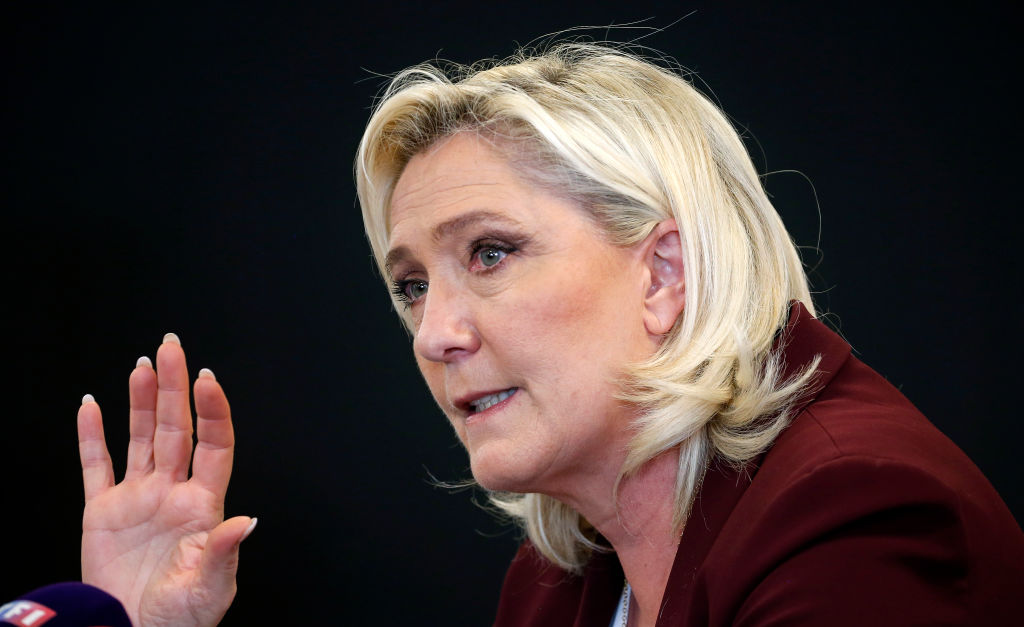
Less than two weeks before the crucial French run-off election between President Emmanuel Macron and his far-right rival Marine Le Pen, Le Pen revealed on Tuesday that if she wins the presidency on April 24, she would not block a Brexit-style referendum on whether France should pull out of the European Union—a decision that would radically reshape Europe, with dramatic ramifications across the world.
In answer to a question from TIME, her comments revived an explosive issue that partly doomed her previous presidential run against Macron in 2017.
“In the case of a referendum that is against the fundamental interests of the country, the president and the National Assembly can oppose it, but that is not the case with an exit from the E.U.,” Le Pen said, on whether a Frexit referendum would be possible under her presidency. She made the remark during a meeting with journalists, while on a campaign stop in the well-to-do commuter town on Vernon, an hour west of Paris. “The French can reassess their presence on whichever international organizations they choose,” she said.
Read More: Emmanuel Macron Is on Track to Win Re-Election. What Comes After Could Be Tougher
In 2017, Le Pen, a hardline nationalist, campaigned for a so-called “Frexit,” arguing that France was suffocating under decisions made at E.U. headquarters in Brussels, and needed to break away from the 27-nation bloc. Even Le Pen’s office in the E.U. Parliament in Brussels—of which she was then an elected member—featured posters calling for Frexit, with hands breaking free from chains.
This time, Le Pen has not pushed to pull France out of the E.U.—part of her effort to align more closely with French voters. Opinion polls show most French are in favor of E.U. membership, although a February survey by the polling agency IFOP found that about 63% of French would support a referendum on the issue.
“Frexit is off the agenda,” a regional politician for Le Pen’s National Rally party told TIME last week, speaking anonymously, saying that Le Pen’s strategy as president would be instead to weaken the E.U., by aligning with other nationalist leaders, like Hungary’s Prime Minister Viktor Orbán, a close ally of hers, who won his fourth term in office earlier this month. “There are so many other countries with likewise views in the E.U. Parliament that we think we can change the E.U. from within,” the politician said.
That, in the eyes of some analysts, could radically change not just the E.U., but NATO too. France is a key member of both institutions. Macron, as French president, is the current rotating leader of the E.U., representing the country with Europe’s largest military force—at a time of war.
Martin Quencez, deputy director in Paris for the German Marshall Fund of the U.S., told TIME on Tuesday that Le Pen’s campaign platform suggests she would override E.U. decisions she does not believe in, such as imposing tight border controls around France, and giving French citizens preference in labor markets; both those violate the E.U.’s core principles. “It is hard to see how this would not lead to France pulling out of the E.U,” Quencez says. “There are opt-outs on every situation, to not implement E.U. decisions if it is against France’s interests.”
Le Pen told journalists on Tuesday that she favored a “referendum revolution,” in which French citizens could organize a popular vote on many different issues. That would be a dramatic break from decades in which a powerful French president has set key policy directions for defense, the economy, security, and foreign relations. Since the French president hand-picks France’s Prime Minister, too, many political decisions emanate from the Elysée Palace—including France’s status in Europe and NATO.
Le Pen’s push for a weaker Europe is starkly at odds with Macron, who has defined his leadership on the basis of more E.U. power—including the need for a European defense force, in order to cut its reliance on U.S. military power. On Tuesday, Macron released a campaign document laying out 10 reasons for French voters to choose him over Le Pen, including “for a strong France within an independent Europe.”
That has become increasingly urgent on the campaign trail, as Macron has cast himself as a wartime president, regularly in talks with Russian President Vladimir Putin. By contrast, Le Pen’s 2017 campaign was financed in part with a loan from a Russian bank, and shortly after Russia’s invasion of Ukraine in February, she pulped a million campaign leaflets showing her shaking hands in Moscow with Putin.
On Tuesday, as a small crowd of protesters and admirers gathered outside the small hotel in the town of Vernon, where Le Pen met journalists, two residents unfurled a handwritten banner, saying ‘Marine Putin!” a chant picked up by some in the crowd.
“Ukraine is very important to us,” said Antoine Richard, 20, one of the two holding the sign. “If Marine Le Pen had won in 2017, I guess we would be participating in the crimes of Mr. Putin right now,” he said.
More Must-Reads from TIME
- Cybersecurity Experts Are Sounding the Alarm on DOGE
- Meet the 2025 Women of the Year
- The Harsh Truth About Disability Inclusion
- Why Do More Young Adults Have Cancer?
- Colman Domingo Leads With Radical Love
- How to Get Better at Doing Things Alone
- Michelle Zauner Stares Down the Darkness
Contact us at letters@time.com